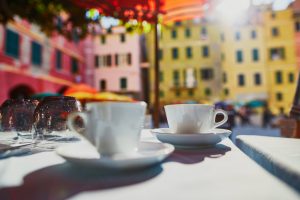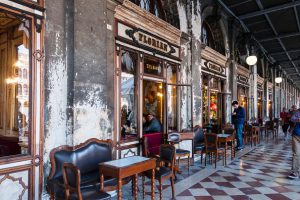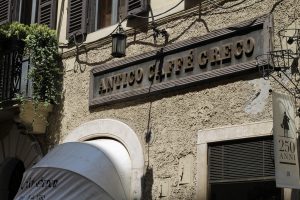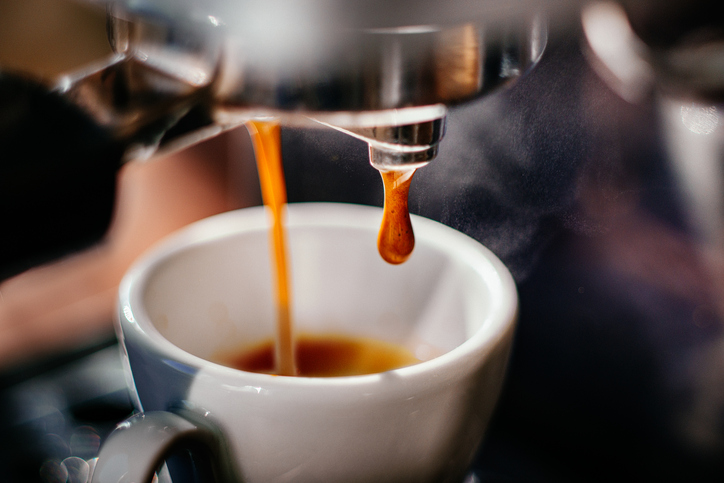Coffee: History and Curious Facts About its Origins
 There is an entire world behind each tiny cup of coffee, a history that has its roots in a distant time. It is thought that the origins of coffee can be placed during the Middle Ages, around the fifteenth century. There are many legends related to the “discovery” of coffee: the most famous tells the story of a shepherd from the region of Caffa in Ethiopia who couldn’t understand why his flock could not sleep after ingesting some berries: the shepherd tried the berries and discovered the stimulating effect of coffee.
There is an entire world behind each tiny cup of coffee, a history that has its roots in a distant time. It is thought that the origins of coffee can be placed during the Middle Ages, around the fifteenth century. There are many legends related to the “discovery” of coffee: the most famous tells the story of a shepherd from the region of Caffa in Ethiopia who couldn’t understand why his flock could not sleep after ingesting some berries: the shepherd tried the berries and discovered the stimulating effect of coffee.
Legends aside, coffee was brought to Yemen by the Ethiopians during their military campaigns and from there it spread quickly throughout the Arabian peninsula.
Coffee was introduced to Europe in the seventeenth century thanks to the Venetian merchants who brought the drink from the East to the West. From that moment on, coffee became an essential part of Italian culture. Soon the drink spread throughout the West and to the Americas: the crops were transported to Central and South America during the travels of the Dutch sailors who touched these areas on their sailing routes.
The Ritual of Coffee in Italy
Italian espresso, fragrant and intense, is an indispensable ritual: you start the day with more energy thanks to a steaming cup of coffee. Coffee marks the different phases of our day: with a good espresso we get started in the morning, then we end lunch with another one, then we share an afternoon break with friends and colleagues, a coffee break, to chat and have another cup.
 How to consume the drink most appreciated by Italians? The natives of the Belpaese will never give up their quick cup at the coffee bar, a strong shot of coffee taken while standing at the counter before continuing with the daily routine. On the other hand, drinking a coffee at the end of a meal is a habit to enjoy at home: think of the moka (coffee pot) that bubbles, “muttering”, on the stove and its scent that floats through the house, a pleasure not to be missed!
How to consume the drink most appreciated by Italians? The natives of the Belpaese will never give up their quick cup at the coffee bar, a strong shot of coffee taken while standing at the counter before continuing with the daily routine. On the other hand, drinking a coffee at the end of a meal is a habit to enjoy at home: think of the moka (coffee pot) that bubbles, “muttering”, on the stove and its scent that floats through the house, a pleasure not to be missed!
But coffee means much more in Italian culture: it has social value and represents a moment to share with someone, or of relaxation to take a break from the day’s chores. It is truly a ritual whose intrinsic meaning is “hospitality.” Saying to someone “let’s have a coffee” actually means “let’s meet each other for a chat”, and so the Italians spend hours in front of a coffee cup telling their stories.
Curious Facts About Coffee
There are many curiosities related to coffee, some of which are truly unique. For example, did you know that the inspiration for the creation of the famous Italian moka, came to its inventor’s mind while he was watching his wife doing the laundry with the old washing machines of the past?
One of the many curiosities related to coffee is that regarding the Neapolitan “Caffè Sospeso” (“suspended coffee” or ‘O cafè suspiso, in dialect). This gesture of generosity, typical of the Neapolitan culture, consists of leaving a cup of coffee paid for ahead of time for any stranger who can’t afford one without expecting anything in return. This tradition offers not only a kind gesture but also one of the best cups of coffee in the world. It is a warmhearted act that characterizes the Neapolitan population.
How to Recognize True Italian Coffee
The preparation of a good cup of coffee is a real art for Italians: taste, aroma and color are key factors to keep in mind while sipping a real espresso. Tradition has it that the best place to enjoy espresso is the coffee bar, while in the homes of Italians, in general, the moka enjoys great popularity. No Italian kitchen is without one.
Among the boldest flavors we have arabica, the robusta, the liberica and the excelsa: these blends have much stronger aromas than the longer coffees that you usually find outside of Italy.
Choosing the best among the over 60 varieties of coffee is difficult if you are not a connoisseur. So here are some tips if you are in Italy and want to sip the best there is. First of all, you can enter any bar and simply say “Vorrei un caffè” that means “I would like a coffee” in Italian. Never ask for an espresso! In Italy, it is already assumed that the “traditional” coffee is espresso!
Do not be fooled: a good coffee depends on the perfect mix of high-quality blends, water quality, outdoor temperature and degree of humidity. It’s all a question of balance! Even the light foam on the surface can be a good indicator: if the sugar you put in the cup slowly sinks to the bottom then get ready, you’re about to enjoy a good coffee, prepared to perfection!
Historic Cafés
 In the seventeenth century the first Italian cafés were born, such as Caffè Florian in Venice in 1720, which is still under the arcades of Piazza San Marco, Caffè Grilli in Florence in 1733, and Caffè Greco in Rome in 1760.
In the seventeenth century the first Italian cafés were born, such as Caffè Florian in Venice in 1720, which is still under the arcades of Piazza San Marco, Caffè Grilli in Florence in 1733, and Caffè Greco in Rome in 1760.
For artists and intellectuals of the time, these places became places to meet and discuss while sipping this fragrant drink. During your tour in Venice, you cannot miss a visit to Caffè Florian, the oldest coffee bar in Italy. It is a magical place that was frequented by the likes of Casanova, Goethe, Rousseau. A relaxing break steeped in history overlooking Piazza San Marco: not to be missed!
Caffè Gilli is a Florentine institution. This beautiful Art Nouveau café was at the hub of Florentine artistic life in the 1700s. Stop here to enjoy an excellent coffee followed by a pastry: the Florentine Schiacciata alla Crema is absolutely the dessert to try.
From Florence to Rome. An obligatory stop in the Eternal City is the Caffè Greco, in via dei Condotti. Here you will experience a one-of-a-kind atmosphere with its nineteenth-century furniture, artwork, and memorabilia that give a glimpse of a different Rome. Here it was usual to find intellectuals such as Gabriele d’Annunzio, Giacomo Leopardi, Wagner, Schopenhauer, Byron, and many other illustrious names of art and literature.
Why not discover these beautiful historic cafés during your exclusive 10-day tour of Rome, Florence and Venice? A unique opportunity to explore Italy through its flavors awaits you.
It is said that the best coffee is found in Naples. Caffè Gambrinus has been the standard of Neapolitan excellence since 1860 when it was established as a salon for Neapolitan intellectual society. Crossing the threshold of this café means taking a journey through history and lingering in the places where Oscar Wilde and Ernest Hemingway stopped to write.

